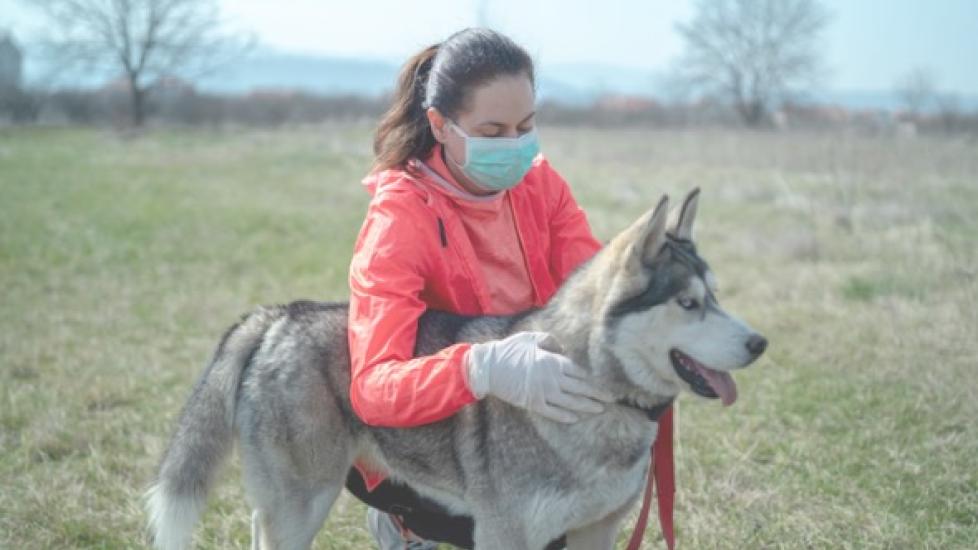How to Keep Pets Safe From COVID-19
During these unprecedented times, new phrases seem to be coined daily. “Social distancing.” “Novel virus.” “Presumptive case vs. positive case.” “Shelter-in-place.”
But while our vernacular may be changing, one thing has stayed the same—how much we love our pets, and how much they love us. And when we’re scared or stressed, there’s nothing better than being close to your pet.
But if we’re sick, could we actually be putting our pets in danger?
A very small number of animals have been reported to be infected with the novel coronavirus after close contact with people who had COVID-19. However, it is still NOT believed that pets can pass COVID_19 to people.
So what should you do to protect your pets? Here’s what you need to know.
What Are the Symptoms of Coronavirus (COVID-19) in Cats and Dogs?
On April 22, 2020, two cats from separate households in New York state tested positive for COVID-19. Both were believed to have contracted the virus through contact with infected people.
The cats had mild respiratory signs and are expected to make a full recovery. These findings were not surprising to scientists and veterinarians due to feline susceptibility to coronaviruses.
A pug in North Carolina has tested positive, as well, after being exposed to three family members who tested positive. The symptoms reported by the family were gagging, a mild cough, and not wanting to eat. The pug was sick for only a few days and made a full recovery.
Two dogs in Hong Kong also tested positive for the virus, but they did not show any signs of illness. Both had contact with COVID-19 positive individuals.
Is There a Vaccine for the Novel Coronavirus in Cats and Dogs?
Currently there are no COVID-19 vaccines available for humans or animals. The World Health Organization (WHO) and the US Centers for Disease Control (CDC) estimate that a vaccine for people could be available in as little as 12-18 months.
Can Cats and Dogs Get Tested for Coronavirus (COVID-19)?
Idexx Laboratories, a global leader in veterinary diagnostics and software, has announced the availability of the Idexx SARS-CoV-2 Real PCR Test for pets. This test is now available to veterinarians in North America, and will roll out worldwide in the coming weeks.
Veterinarians can order the test after consulting with a public health authority (for example, a state public health veterinarian in the United States), if three criteria are met:
- The pet is living in a household with a human who has COVID-19 or has tested positive for the virus.
- The pet has already been tested for more common infections, which a veterinarian has ruled out.
- The pet (especially cats and ferrets) is showing clinical signs associated with COVID-19.
Idexx does not expect this veterinary test to have an impact on human COVID-19 testing or availability.
How Do You Keep Your Pet Safe If You Have COVID-19?
If you actively have COVID-19, or suspect that you might, restrict your contact with your pets and other animals. When it’s possible, have another member of your family care for your pets while you are ill.
Avoid direct contact with your pets, including sharing food, snuggling/petting, and kissing your pets. If you are the sole caregiver for your pets, wash your hands before and after contact with your pets and wear a face mask as advised by your doctor.
Will My Pet Get COVID-19 at the Vet’s Office?
Veterinary hospitals are doing everything they can to keep themselves, their clients, and their patients safe and healthy. Many are reducing the number of wellness appointments and elective procedures, as well as cutting back staff hours.
Most are not allowing clients into the hospital, and instead a member of the staff brings your pet into the hospital while wearing PPE. Some are offering virtual appointments for established clientele.
If your pet must be seen by a veterinarian, call ahead to find out the procedures they have in place, and ALWAYS follow the protocol. Veterinarians have been deemed essential during these challenging times, but they want to keep you, your pets, and themselves safe. This can only be done if everyone follows the rules.
When you bring your pet home from the veterinarian, or even from a walk around the block, consider giving their paws a quick wipe-down to prevent tracking in any germs. A simple soap and water solution will do the trick.
How to Practice Safety While Walking Your Dog
You should still walk your dog, because it’s important for their health. Here are some answers to questions you might have about keeping your dog safe from COVID-19 while out on your daily walks.
Should I stay away from other people/dogs on our walks?
The CDC recommends that you avoid places where large numbers of dogs and people gather, like dog parks, at this time. Walk your dog on a leash no longer than 6 feet so you can keep your pet close and avoid contact between other dogs and people along the way.
You might be tempted to pet friendly dogs who stick their noses through a fence to greet you. Remember though, that people have the possibility of passing COVID-19 to other people’s pets, and not everyone shows symptoms of the illness right away or at all. So stay a good distance away and do not attempt to pet neighborhood dogs (or cats!).
At the same time, if you do let your dog out into your fenced yard, they should be supervised in general, and especially to prevent contact with neighbors through the fence.
Should my dog wear a face mask?
There is no evidence that masks made for pets are effective in preventing diseases transmitted by bodily fluid droplets. Instead, masks may cause your pets to have anxiety or breathing issues.
To protect your pet from respiratory illnesses, discuss vaccinating your pet for Bordetella, parainfluenza, and canine influenza—the most common preventable respiratory illnesses in pets.
Precautions to Take to Keep Cats Safe
Cats do seem to be susceptible to COVID-19, as three domestic cats and several tigers have tested positive. These cats were all exposed to humans who tested COVID-19 positive. With over 2.7 million (human) cases worldwide (as of 4/24) and only three confirmed positive domestic cats, susceptibility is apparently low.
It is not believed that cats can pass COVID-19 back to people. Cat owners should continue to check back for updates on this, but there is no reason to stop interacting with your cats, particularly if you are healthy.
If you are ill with COVID-19 (or have symptoms), have someone else care for your pet if possible, wash your hands thoroughly before and after contact, and wear a mask when you are around your cat.
Should I keep my indoor/outdoor cat inside?
At this time, it is recommended to keep cats and dogs away from people outside your home (other than necessary veterinary visits where precautions are being taken). That means keeping cats indoors as well.
Featured Image: iStock.com/MajaMitrovic
RELATED ARTICLES
How Plan for Your Pet’s Care if You Get COVID-19


